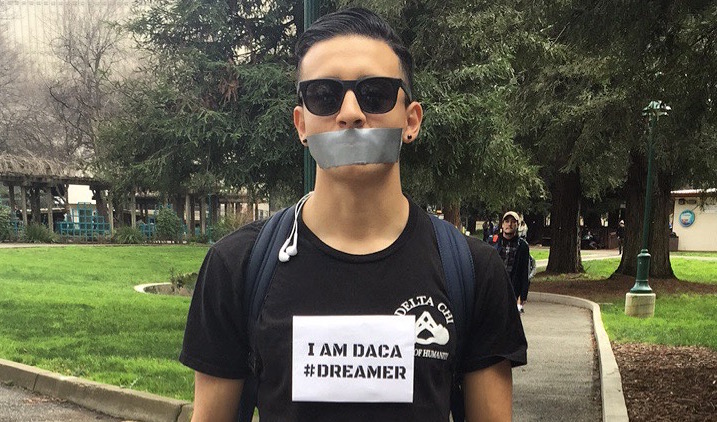EDITORIAL: Any decision to end DACA sets U.S. in reverse
Courtesy of Pedro Cisneros
Sacramento State student Everardo Chavez wears signs on his chest identifying himself as a Deferred Action for Childhood Arrivals (DACA) participant as part of a silent protest on campus on Feb. 16. Chavez was protesting as part of A Day Without Immigrants, a nationwide protest against President Donald Trump’s immigration policies.
September 6, 2017
Imagine having known only one place and calling it home your entire life. All of your closest friends and fondest childhood memories and everything else that truly matters to you are a culmination of the life you’ve lived in this particular place. Aside from stories of a foreign land that your parents often tell you about, nothing else feels familiar to you.
Now imagine that the place you’ve only heard stories of will become your home. Imagine the only life you’ve ever know being ripped away because of events that were out of your control since they happened when you were only a child.
Well, this imaginary scenario has the potential to become a reality for hundreds of thousands of people as President Donald Trump is expected to end the Deferred Action for Childhood Arrivals program.
DACA is an immigration policy that was founded by the Obama administration in June 2012. It allows certain undocumented immigrants to legally obtain a driver’s license, go to college and work here in the states for increments of two years at a time. In order to be eligible, the individual had to arrive in the U.S before they were 16 years old and had to have lived here since June 15, 2007.
The program was designed to assist the students who had been in the United States for the majority of their lives and prevent immigration enforcement resources from focusing on individuals that were “low priority.”
If Trump were to end DACA, nearly 800,000 DREAMers — the undocumented immigrants who were brought over as children — would be stripped of their status and privileges and would be told to return to the country where they were born.
Keep in mind, Trump promised to “show great heart” when dealing with DACA. Unless there’s a suitable replacement in the works, Trump is going back on his word and proving that he will say whatever he needs to in order to get by.
Currently, there are over half a million people in California alone who could benefit from DACA and achieve a lot more than they would by their own means. Not only could they achieve personal growth, but they would have more opportunities to give back to the society that so vehemently insists that they take more than they give.
They give back as workers. The Center for American Progress wrote that ending DACA would “remove an estimated 685,000 workers from the nation’s economy,” costing $460.3 billion from the national GDP over the next decade.
They also give back like Alonso Guillen, a Texas resident and DACA recipient who died on a rescue mission during the destruction of Hurricane Harvey.
To punish an entire group of people for acts they were forced to commit when they were children is simply cruel. It doesn’t make any sense and it goes against everything that this country should stand for.
RELATED:





























































































































